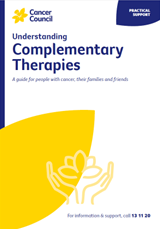- Home
- About Cancer
- Advanced cancer
- Palliative care
- Palliative treatment
- Complementary therapies
Complementary therapies
People often use the terms “complementary” and “alternative” as though they mean the same thing, but it is important to understand how they are different.
Complementary therapies are widely used alongside conventional medical treatments, usually to help manage side effects of cancer or its treatment. Therapies such as meditation, massage and acupuncture may increase your sense of control, decrease stress and anxiety, and improve your mood.
Alternative therapies are used instead of conventional medical treatments. Many alternative therapies have not been scientifically tested, so there is no evidence that they stop cancer growing or spreading. Others have been tested and shown to be harmful to people with cancer or not to work. Cancer Council does not recommend the use of alternative therapies as a cancer treatment.
Let your doctors know about any therapies you are using or thinking about trying, as some may not be safe or evidence-based, or may not work well with your current treatment.
Learn more about complementary therapies.
→ READ MORE: Palliative care for young people
Meditation and relaxation podcast
Listen to more of our meditation and relaxation podcast for people affected by cancer
More resources
Prof Meera Agar, Palliative Care Physician, Professor of Palliative Medicine, University of Technology Sydney, IMPACCT, Sydney, NSW; Anne Booms, Nurse Practitioner, Palliative Care, Icon Cancer Centre Midlands, WA; Nicola Champion, Consumer; John Clements, Consumer; Dr Alexandra Clinch, Palliative Medicine Specialist and Deputy Director, Palliative Care, Peter MacCallum Cancer Centre and Royal Melbourne Hospital, VIC; A/Prof Jaklin Eliott, School of Public Health, University of Adelaide, SA; Dr Jemma Gilchrist, Clinical Psychologist, Mind My Health, NSW; McCabe Centre for Law and Cancer, VIC; Caitlin MacDonagh, Clinical Nurse Consultant, Palliative Care, Royal North Shore Hospital, NSW; Dr Roya Merie, Radiation Oncologist, Icon Cancer Centre, Concord, NSW; Dr Deidre Morgan, Research Centre for Palliative Care, Death and Dying, Flinders University, SA; Caitriona Nienaber, 13 11 20 Consultant, Cancer Council WA; Palliative Care Australia.
View the Cancer Council NSW editorial policy.
View all publications or call 13 11 20 for free printed copies.

